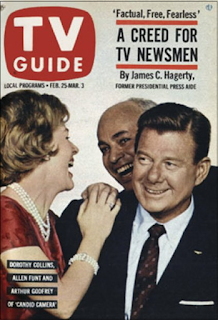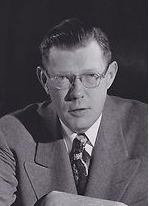This week in TV Guide: February 25, 1961
 James Hagerty, prior to becoming head of ABC News, was President Eisenhower's press secretary - so it is with this dual authority that he offers, in this week's edition, a "Creed for Television Newsmen." There are six points to this creed:
James Hagerty, prior to becoming head of ABC News, was President Eisenhower's press secretary - so it is with this dual authority that he offers, in this week's edition, a "Creed for Television Newsmen." There are six points to this creed:1. TV news reporting must be "factual, impartial, free and fearless. It cannot permit itself to be dominated or even remotely to be associated with any group or faction of special interest, any political party or any government."
2. While analyzing and explaining news developments, "it must not confuse news reporting with personal opinion of a commentator who, after all, is expressing only his own thoughts and analysis."
3. Local, regional and national news "must never be neglected or overlooked."
4. News must be reported from "all sections" of the world, regarding a larger staff of trained reporters with expertise in foreign languages.
5. TV news cameras "must have the right to cover news wherever it happens, here at home or overseas."
6. "A good reporter does not seek to fake or exaggerate his story. He gets the news as it happens, and reports the truth, the whole truth. That is his job."
Politics is part of the cultural history not only of this country but of television, and so I've spent a fair amount of time on it. I've tried, however, to keep my distance when it comes to ideological interjections, although I've got a fair number of opinions (as anyone who knows me can attest). Having said this, I find it interesting that fully three of Hagerty's six points deal with the importance of neutral and objective reporting. Now, without injecting any partisanship, I think we can all agree on the importance of this, and I hope we can also acknowledge that, no matter which side of the political fence you stand on, television news falls woefully short not only in this area but on all of Hagerty's points.
 Hagerty served as head of
Hagerty served as head ofABC News from 61-63Obviously, this isn't a new problem; Hagerty wouldn't have made such an issue of it otherwise. But one of the more unfortunate aspects of the fragmentation of American society over the decades is that the discerning viewer can pretty much watch whichever news program slants towards his or her point of view. Just as music doesn't need to appeal to the masses any longer, and thus shatters into a million different niche networks, there is no incentive for any news program to offer objective, unbiased coverage. Liberal? Watch MSNBC or CNN. Conservative? Fox News. Human interest stories? There's always the networks, who seem to have pretty much given up on hard stuff. And so on.
This isn't the place to debate solutions to the situation, of course, but one further point before we move on: Hagerty's first point, that the news must be kept separate from special interests, is one reason why Reuven Frank, as producer of NBC's Huntley-Brinkley Report, kept it commercial-free in its early years. Frank understood that a news program had to avoid even the hint of a conflict of interest. Considering the amount of influence sponsors exercised over programs in the early days of TV, it's no wonder Frank wanted to keep the news free of such entanglements. Of course, today the bottom line in TV news is not journalism so much as the network's profit-loss statement. So I guess none of us should be surprised.
Published on February 23, 2019 05:00
No comments have been added yet.
It's About TV!
Insightful commentary on how classic TV shows mirrored and influenced American society, tracing the impact of iconic series on national identity, cultural change, and the challenges we face today.
- Mitchell Hadley's profile
- 5 followers



